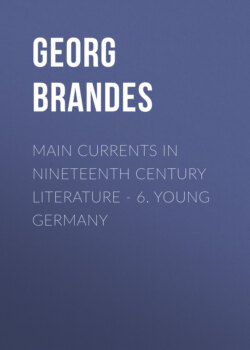Читать книгу Main Currents in Nineteenth Century Literature - 6. Young Germany - Георг Брандес - Страница 14
На сайте Литреса книга снята с продажи.
Оглавление[1] Hermann Grimm: Goethe.
[2] Gutzkow: Börne's Leben.—M. Holzmann: Ludwig Börne. Sein Leben und Wirken.
[3] Steinthal: Ludwig Börne. Illustrirte deutsche Monatshefte, Juni 1881.
[4] L. Börne: Gesammelte Schriften. Reclam. Leipzig, III. 112, 129, 167, 173, 209, 244, 259, 313.
[5] See Main Currents, iii. chap. xiii.
[6] "Was jeder Morgen brachte, was jeder Tag beschien, was jede Nacht bedeckte, dieses zu besprechen hatte ich Lust und Muth."
What each morning brought, each day's sun shone on, each night covered—that was what I had the desire and the courage to discuss.
[7] "Im Centrum seines Geistes trafen unzählige Strahlen zusammen, nur dass dieselben durch keine Peripherie verbunden waren."
Countless rays were focussed in the central point of his mind, but no periphery united these rays.
[8] So I said: Yes, my Lord, with God's help I can do it, can bring us all safe to land. Then I was unloosed, and took the helm and steered honourably onward.
[9] Karl Hillebrand: "La société de Berlin," in Revue des Deux Mondes.
[10] Fürst: Henriette Herz, p. 185.
[11] Briefe des jungen Börne an Henriette Herz, 164, 167. "O, wenn ich dies bedenke, wie ein Sturm braust es in meinem Innersten, es möchte die Seele aus ihrem Wohnhaus stürzen, und sich den Leib eines Löwen suchen, dass sie den Frechen begegnen könnte mit Klauen und Gebiss."
Oh, when I think of this, a storm rages within me; the soul struggles to burst from its lodging, that it may find for itself the body of a lion, and rush upon the shameless ones with claws and teeth.
[12] "Aber lasst uns nicht, männernde Jünglinge, unsere Kraft vergeuden, sondern die Lust in keuscher Ehe umarmen, damit sie fruchtbar und unsterblich werde … Es ziemt uns nicht, uns keck in den Rath der Fürsten einzudringen; sie sind besser als wir."
But let us not squander our strength, O youths who are becoming men; let us embrace joy in chaste wedlock, that she may become fruitful and immortal. … It becomes us not audaciously to thrust ourselves into the counsels of princes; they are better than we.
[13] Karl Gutzkow: "Birne's Leben, Ges. Werke, xii. 328, 329.
[14] Metternich was even acquainted with the later, quite revolutionary letters from Paris. On the 26th of January 1834, Princess Melanie Metternich writes in her diary: "I spent the early hours of the evening with Clemens, to whom I read Börne's Letters from Paris. They are of course as malicious as possible, but the style, with its dæmonic extravagance, is remarkably clever." (Metternich's Posthumous Papers, v. 545, quoted by Holzmann.)
[15] He writes to his father: "Gentz, too, was doubtless a Liberal to begin with, but he could give securities for a sincere conversion which I cannot give. He had been sold to England for many years before he took service with Austria. He is sensual, extravagant, the most dissolute man in the country."
[16] "A frog, a cucumber, a leg of mutton, a Wilhelm Meister, a Christ—it is all the same to them; they actually forgive a Madonna her holiness, if she is well painted. So am not I, and never was. In nature I have always sought God, God only, and in art the divine; and where I did not find God, I saw nothing but miserable botch-work. History, men, and books I have judged in like manner—unfortunately!"
[17] "I have never been able to understand their conception of fate, their confusion of the antique with the Romantic idea, their Christian paganism. Death is either a loving father, who comes to fetch his child home from the school of life, in which case fate is not tragic; or he is the cannibal Kronos, who swallows his own children, in which case it is unchristian. Your fate is a hermaphrodite, unable either to beget or to bring forth."
[18] Briefe des jungen Börne, p. 143.
